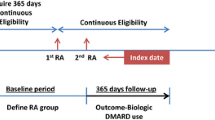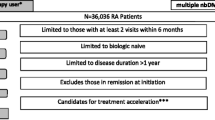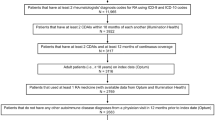Abstract
Despite the availability of treatment guidelines and effective treatments, real-world effectiveness remains suboptimal partly due to poor patient medication adherence. We evaluated a comprehensive set of sociodemographic, health insurance, and disease-related factors for association with patient decision to discontinue anti-rheumatic medications (ARMs) in a large observational RA cohort in Ontario, Canada. Patients from the Ontario Best Practices Research Initiative registry were included. The following predictors of ARM discontinuation were evaluated with cox-regression: patient age, gender, education, income, smoking, health insurance type/coverage, RA duration, erosion presence, RF positivity, DAS28-ESR, physician global, HAQ-DI, comorbidity number, ARM types, and physician characteristics (gender, academic position, urban vs. rural, distance from patient’s residence). Patients (1762) were included with a mean (SD) age of 57.4 years (13.0). Approximately 80% were female, 29% had early (≤ 1 year) RA, and 70% were RF-positive. Mean (SD) baseline DAS28-ESR and HAQ-DI were 4.5 (1.5) and 1.2 (0.76), respectively. In multivariate analysis, married status (HR [95%CI] 0.73 [0.56–0.96]), RF positivity (0.73 [0.56–0.96]), and higher comorbidity number (0.92 [0.85–0.99]) were significant predictors of ARMs continuation while higher physician global (1.10 [1.04–1.15]), NSAID use (1.75 [1.29–2.38]), and number of ARMs (1.23 [1.07–1.40]) were associated with ARMs discontinuation. In a subset analysis assessing conventional or biologic DMARD discontinuation, higher HAQ-DI and biologic use over time were associated with lower hazard for discontinuation. Several sociodemographic, disease, and treatment parameters were identified as independent predictors of patient discontinuation of ARMs. These results should be considered when developing patient adherence support programs and in the choice of treatment regimens.

Similar content being viewed by others
References
World Health Organization (2003) Adherence to long-term therapies: evidence for action. URL: http://www.who.int/chp/knowledge/publications/adherence_report/en/
Pasma A, Schenk CV, Timman R, Busschbach JJ, van den Bemt BJ, Molenaar E, van der Laan WH, Schrauwen S, Van't Spijker A, Hazes JM (2015) Non-adherence to disease-modifying antirheumatic drugs is associated with higher disease activity in early arthritis patients in the first year of the disease. Arthritis Res Ther 17:281
Waimann CA, Marengo MF, de Achaval S, Cox VL, Garcia-Gonzalez A, Reveille JD, Richardson MN, Suarez-Almazor ME (2013) Electronic monitoring of oral therapies in ethnically diverse and economically disadvantaged patients with rheumatoid arthritis: consequences of low adherence. Arthritis Rheum 65(6):1421–1429
Molina E, Del Rincon I, Restrepo JF, Battafarano DF, Escalante A (2015) Association of Socioeconomic Status with Treatment Delays, Disease Activity, Joint Damage, and Disability in Rheumatoid Arthritis. Arthritis Care Res 67(7):940–946
Harrold LR, Briesacher BA, Peterson D, Beard A, Madden J, Zhang F et al (2013) Cost-related medication nonadherence in older patients with rheumatoid arthritis. J Rheumatol 40(2):137–143
De Vera MA, Mailman J, Galo JS (2014) Economics of non-adherence to biologic therapies in rheumatoid arthritis. Curr Rheumatol Rep 16(11):460
Smolen JS, Landewe R, Breedveld FC, Buch M, Burmester G, Dougados M et al (2014) EULAR recommendations for the management of rheumatoid arthritis with synthetic and biological disease-modifying antirheumatic drugs: 2013 update. Ann Rheum Dis 73(3):492–509
van den Bemt BJ, Zwikker HE, van den Ende CH (2012) Medication adherence in patients with rheumatoid arthritis: a critical appraisal of the existing literature. Expert Rev Clin Immunol 8(4):337–351
Salt E, Frazier SK (2011) Predictors of medication adherence in patients with rheumatoid arthritis. Drug Dev Res 72(8):756–763
Vangeli E, Bakhshi S, Baker A, Fisher A, Bucknor D, Mrowietz U, Östör AJ, Peyrin-Biroulet L, Lacerda AP, Weinman J (2015) A systematic review of factors associated with non-adherence to treatment for immune-mediated inflammatory diseases. Adv Ther 32(11):983–1028
Salt E, Frazier SK (2010) Adherence to disease-modifying antirheumatic drugs in patients with rheumatoid arthritis: a narrative review of the literature. Orthop Nurs 29(4):260–275
Pasma A, van't Spijker A, Hazes JM, Busschbach JJ, Luime JJ (2013) Factors associated with adherence to pharmaceutical treatment for rheumatoid arthritis patients: a systematic review. Semin Arthritis Rheum 43(1):18–28
Salaffi F, Carotti M, Di Carlo M, Farah S, Gutierrez M (2015) Adherence to anti-tumor necrosis factor therapy administered subcutaneously and associated factors in patients with rheumatoid arthritis. J Clin Rheumatol 21(8):419–425
Solomon DH, Tonner C, Lu B, Kim SC, Ayanian JZ, Brookhart MA et al (2014) Predictors of stopping and starting disease modifying anti-rheumatic drugs for rheumatoid arthritis. Arthritis Care Res 66(8):1152–1158
Morgan C, McBeth J, Cordingley L, Watson K, Hyrich KL, Symmons DP et al (2015) The influence of behavioural and psychological factors on medication adherence over time in rheumatoid arthritis patients: a study in the biologics era. Rheumatology (Oxford) 54(10):1780–1791
Mjaavatten MD, Radner H, Yoshida K, Shadick NA, Frits ML, Iannaccone CK et al (2014) Inconsistent treatment with disease-modifying antirheumatic drugs: a longitudinal data analysis. J Rheumatol 41(12):2370–2378
Joplin S, van der Zwan R, Joshua F, Wong PK (2015) Medication adherence in patients with rheumatoid arthritis: the effect of patient education, health literacy, and musculoskeletal ultrasound. Biomed Res Int 2015:150658
Pascual-Ramos V, Contreras-Yanez I (2013) Motivations for inadequate persistence with disease modifying anti-rheumatic drugs in early rheumatoid arthritis: the patient’s perspective. BMC Musculoskelet Disord 14:336
Cramer JA, Roy A, Burrell A, Fairchild CJ, Fuldeore MJ, Ollendorf DA et al (2008) Medication compliance and persistence: terminology and definitions. Value Health 11(1):44–47
Park DC, Hertzog C, Leventhal H, Morrell RW, Leventhal E, Birchmore D et al (1999) Medication adherence in rheumatoid arthritis patients: older is wiser. J Am Geriatr Soc 47(2):172–183
Tuncay R, Eksioglu E, Cakir B, Gurcay E, Cakci A (2007) Factors affecting drug treatment compliance in patients with rheumatoid arthritis. Rheumatol Int 27(8):743–746
de Thurah A, Nørgaard M, Johansen MB, Stengaard-Pedersen K (2010) Methotrexate compliance among patients with rheumatoid arthritis: the influence of disease activity, disease duration, and co-morbidity in a 10-year longitudinal study. Scand J Rheumatol 39(3):197–205
Borah BJ, Huang X, Zarotsky V, Globe D (2009) Trends in RA patients’ adherence to subcutaneous anti-TNF therapies and costs. Curr Med Res Opin 25(6):1365–1377
Acknowledgements
The authors would like to thank the following investigators participating in OBRI:
Ahluwalia, V., Ahmad, Z., Akhavan, P., Albert, L., Alderdice, C., Aubrey, M., Bajaj, S., Bensen, B., Bhavsar, S., Bombardier, C., Bookman, A., Carette, S., Carmona, R., Chow, A., Ciaschini, P., Cividino, A., Cohen, D., Dixit, S., Haaland, D., Hanna, B., Haroon, N., Hochman, J., Jaroszynska, A., Johnson, S., Joshi, R., Kagal, A., Karasik, A., Karsh, J., Keystone, E., Khalidi, N., Kuriya, B., Larche, M., Lau, A., LeRiche, N., Leung, Fe., Leung, Fr., Mahendira, D., Matsos, M., McDonald-Blumer, H., Mittoo, S., Mody, A., Montgomery, A., Mulgund, M., Ng, E., Papneja, T., Pavlova, P., Perlin, L., Pope, J, Purvis, J., Rohekar, G., Rohekar, S., Samadi, N., Shaikh, S., Shickh, A., Shupak, R., Smith, D., Soucy, E., Stein, J., Thompson, A., Thorne, C., Wilkinson, S.
Author information
Authors and Affiliations
Corresponding author
Ethics declarations
OBRI was funded by peer-reviewed grants from CIHR (Canadian Institute for Health Research), Ontario Ministry of Health and Long-Term Care (MOHLTC), Canadian Arthritis Network (CAN), and unrestricted grants from AbbVie, Amgen, Bristol Myers Squibb, Celgene, Hospira, Janssen, Pfizer, Roche, Sanofi, and UCB.
Disclosures
None.
Rights and permissions
About this article
Cite this article
Ahluwalia, V., Rampakakis, E., Movahedi, M. et al. Predictors of patient decision to discontinue anti-rheumatic medication in patients with rheumatoid arthritis: results from the Ontario best practices research initiative. Clin Rheumatol 36, 2421–2430 (2017). https://doi.org/10.1007/s10067-017-3805-4
Received:
Revised:
Accepted:
Published:
Issue Date:
DOI: https://doi.org/10.1007/s10067-017-3805-4




